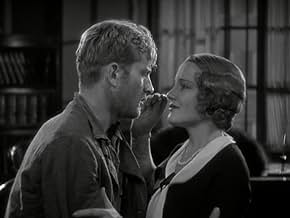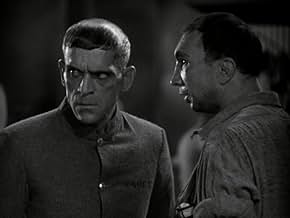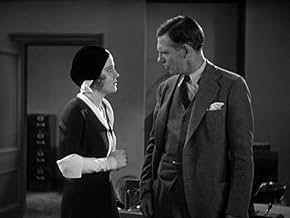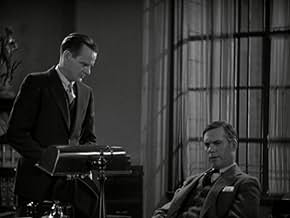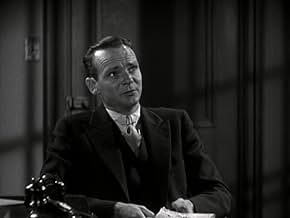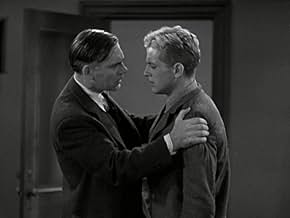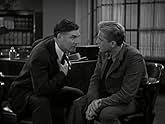VALUTAZIONE IMDb
6,9/10
1546
LA TUA VALUTAZIONE
Dopo un fallito tentativo di candidarsi a governatore, il procuratore distrettuale Mark Brady viene nominato direttore del carcere statale dove sono incarcerati molti dei criminali da lui pe... Leggi tuttoDopo un fallito tentativo di candidarsi a governatore, il procuratore distrettuale Mark Brady viene nominato direttore del carcere statale dove sono incarcerati molti dei criminali da lui perseguiti.Dopo un fallito tentativo di candidarsi a governatore, il procuratore distrettuale Mark Brady viene nominato direttore del carcere statale dove sono incarcerati molti dei criminali da lui perseguiti.
- Regia
- Sceneggiatura
- Star
- Candidato a 1 Oscar
- 3 vittorie e 1 candidatura in totale
DeWitt Jennings
- Captain Gleason
- (as De Witt Jennings)
Paul Porcasi
- Tony Spelvin
- (as Paul Porcassi)
Richard Bishop
- Minor Role
- (non citato nei titoli originali)
Andy Devine
- Cluck - a Convict with knife
- (non citato nei titoli originali)
James Guilfoyle
- Detective Doran
- (non citato nei titoli originali)
Frank Hagney
- Prison Guard in Yard
- (partecipazione non confermata)
- (non citato nei titoli originali)
Recensioni in evidenza
Sometimes you seem to get into a position where you have to take your medicine for an even unintended actions. That is what happens to poor 20-year-old Bob Graham, and within 10 minutes into the movie, he's in the infinite world of prison, where he must learn yet another set of codes of the criminal sort. Creepy Ned Galloway (Boris Karloff just before his "Frankenstein" turn) takes a rather minor (at least early on) role and fills it with gusto (maybe its that creepy little haircut) in a claustrophobic cell. Later, he does the right thing for rehabilitated and soon-to-be-paroled (maybe) Graham, who does not violate the titular Criminal Code (since he's still a con).
James Whale wanted Karloff for his monster after seeing Boris in this flick, and after you see it, you'll know why.
BTW, who doesn't love a good prison movie yarn, and with Karloff in it, it rates a "9."
James Whale wanted Karloff for his monster after seeing Boris in this flick, and after you see it, you'll know why.
BTW, who doesn't love a good prison movie yarn, and with Karloff in it, it rates a "9."
"The Criminal Code" is centered around the theme "An Eye for An Eye." This theme is the reason that young Robert Graham is sent to prison, the reason why the prisoners object to the D.A. becoming the Warden of the prison, and the reason why Graham is sent to "the hole" near the end of the film. For 1931, it was one of the first critical looks at this theme. It raises certain questions as to the morals of the law, and the Criminal Code versus the Prisoners Code. Phillips Holmes gives a good enough performance as Robert Graham, and Boris Karloff came off well as the inmate with a bone to pick (months before becoming Frankenstein), but the performance that I liked the most was Walter Huston, who played the D.A.-turned-prison-warden. Huston's character was a wily one, who said "Yeah" and "Yeah?" about a hundred times throughout the film.
I would say it is THE best except for my fondness for "Caged." This is a brilliant movie, as shocking as Hawks's "Scarface," released a year later and far better known.
Walter Huston is a district attorney when we met him. Throughout, he is given to the one word, catchall statement or response "Yeah." Huston has rarely if ever been better -- and he was one of the greats of Hollywood history.
Phillips Holmes is excellent as a young man he sends to prison. He is innocent in all senses before he gets there. But he quickly leans the code of the title.
Constance Cummins isn't given much as Huston's daughter but she is appealing. However, Boris Karloff gives one of his very finest performances as a tough but decent prisoner. Of course, of course he is fine in "Frankenstein." And he is wildly brilliant in "Lured" many years later. Here he gives a solid, unadorned, moving performance.
Clark Marshall, a name I do not recognize, is also fine. He plays a sniveling, conniving inmate. And DeWitt Jennings is shocking as a brutal guard.
Amazingly, I had never seen this movie before tonight. It's bone I will want to see again; and I urge you to see it, too.
Walter Huston is a district attorney when we met him. Throughout, he is given to the one word, catchall statement or response "Yeah." Huston has rarely if ever been better -- and he was one of the greats of Hollywood history.
Phillips Holmes is excellent as a young man he sends to prison. He is innocent in all senses before he gets there. But he quickly leans the code of the title.
Constance Cummins isn't given much as Huston's daughter but she is appealing. However, Boris Karloff gives one of his very finest performances as a tough but decent prisoner. Of course, of course he is fine in "Frankenstein." And he is wildly brilliant in "Lured" many years later. Here he gives a solid, unadorned, moving performance.
Clark Marshall, a name I do not recognize, is also fine. He plays a sniveling, conniving inmate. And DeWitt Jennings is shocking as a brutal guard.
Amazingly, I had never seen this movie before tonight. It's bone I will want to see again; and I urge you to see it, too.
DA Brady sends young Graham to prison unjustly, and must redeem himself once he becomes the prison's warden.
The credits indicate icon Howard Hawks as the director; IMDb uncharacteristically lists no one; while Hawks' bio-site states he's the uncredited helmsman. I include this rather puzzling movie pedigree because I see very little of Hawks' characteristic style on screen. He may well have been adjusting to the new factor of sound (as others point out), but whatever the reason, the screenplay could have been filmed by any number of solid Hollywood craftsmen.
The movie itself has been made several times over, so the material is familiar. But except for Huston's dynamic performance and Karloff's formidable presence, there's not much to recommend beyond the story itself. The prison yard scenes are riveting with their marching phalanxes of inmates. Sort of like a non-musical Busby Berkeley. I also like that early scene where DA Brady (Huston) strips away shady lady Gertie's thin façade of respectability. To me, its spirited air bespeaks Hawks' guiding hand, as does Brady's surprisingly intense grilling of Graham. However, what should be a highlight, Ned's (Karloff) revenge killing of the squealer, is unnecessarily down-played for this pre-Code period.
Note how we're led to respect the inmates' code of conduct even though they are convicted criminals. Both the law and the inmates have their respective codes, but more importantly, the codes may well be linked by a common sense of justice. When, for example, those codes are broken by the squealer, on one hand, and by head guard Gleason, on the other, we're led to sympathize with the respective acts of retribution, bloody though they undoubtedly are. And since both acts are carried out by the hulking Ned, he becomes something of an avenging angel despite his gruesome appearance. It's the ambiguities of the two codes, united, perhaps, by a common sense of justice that suggests an interesting subtext to the story.
Anyway, in my little book, this is a Walter Huston showcase, proving again that an actor of less than handsome appearance could carry a Hollywood movie.
The credits indicate icon Howard Hawks as the director; IMDb uncharacteristically lists no one; while Hawks' bio-site states he's the uncredited helmsman. I include this rather puzzling movie pedigree because I see very little of Hawks' characteristic style on screen. He may well have been adjusting to the new factor of sound (as others point out), but whatever the reason, the screenplay could have been filmed by any number of solid Hollywood craftsmen.
The movie itself has been made several times over, so the material is familiar. But except for Huston's dynamic performance and Karloff's formidable presence, there's not much to recommend beyond the story itself. The prison yard scenes are riveting with their marching phalanxes of inmates. Sort of like a non-musical Busby Berkeley. I also like that early scene where DA Brady (Huston) strips away shady lady Gertie's thin façade of respectability. To me, its spirited air bespeaks Hawks' guiding hand, as does Brady's surprisingly intense grilling of Graham. However, what should be a highlight, Ned's (Karloff) revenge killing of the squealer, is unnecessarily down-played for this pre-Code period.
Note how we're led to respect the inmates' code of conduct even though they are convicted criminals. Both the law and the inmates have their respective codes, but more importantly, the codes may well be linked by a common sense of justice. When, for example, those codes are broken by the squealer, on one hand, and by head guard Gleason, on the other, we're led to sympathize with the respective acts of retribution, bloody though they undoubtedly are. And since both acts are carried out by the hulking Ned, he becomes something of an avenging angel despite his gruesome appearance. It's the ambiguities of the two codes, united, perhaps, by a common sense of justice that suggests an interesting subtext to the story.
Anyway, in my little book, this is a Walter Huston showcase, proving again that an actor of less than handsome appearance could carry a Hollywood movie.
10whpratt1
Boris Karloff appeared on the stage of the Belasco Theatre, New York City in the role of Galloway in a Martin Flavin stage play. It was a minor part, however, it was an important one: Galloway, the prison trusty who becomes a killer. On the strength of his performance, he was soon cast in the film version. During 1931-32, twenty-three of his films were released, an average of nearly one a month which included Frankenstein. Criminal Code was the big break Karloff was waiting for and he never gave up acting until the very end.
Lo sapevi?
- QuizThe prison yard sequence was shot at M-G-M, using the set originally built for "The Big House" (1930).
- BlooperPaul Porcasi's name is spelled "Porcassi" in the opening credits.
- Citazioni
Mark Brady: [to Graham] Tough luck, Bob, but that's the way they break sometimes. You got to take them the way they fall.
- Curiosità sui creditiThe film's credits do not say that Howard Hawks directed the film; instead, they say that the film is "A Howard Hawks Production."
- ConnessioniAlternate-language version of El código penal (1931)
I più visti
Accedi per valutare e creare un elenco di titoli salvati per ottenere consigli personalizzati
Dettagli
- Data di uscita
- Paese di origine
- Lingua
- Celebre anche come
- The Criminal Code
- Luoghi delle riprese
- Azienda produttrice
- Vedi altri crediti dell’azienda su IMDbPro
- Tempo di esecuzione
- 1h 37min(97 min)
- Colore
Contribuisci a questa pagina
Suggerisci una modifica o aggiungi i contenuti mancanti

